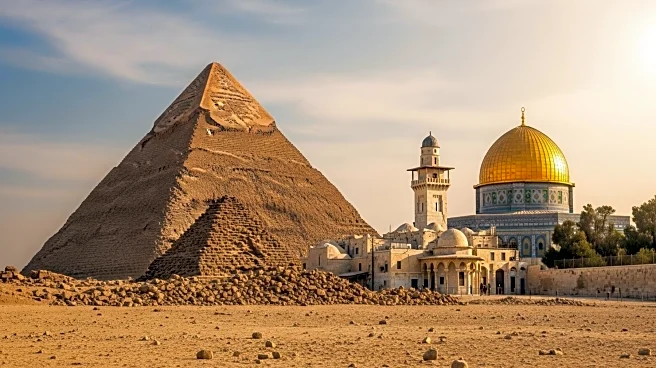What is the story about?
What's Happening?
President Trump is set to travel to Israel and Egypt, as discussions continue regarding the ceasefire between Israel and Hamas. Former National Security Council Director Javed Ali spoke with ABC News about the implications of this visit. The trip comes at a critical time as efforts to stabilize the region are underway following recent conflicts. The visit aims to reinforce diplomatic ties and support ongoing peace negotiations. President Trump's engagement in the Middle East is seen as a strategic move to bolster U.S. influence and facilitate dialogue between conflicting parties.
Why It's Important?
The visit by President Trump to Israel and Egypt is significant as it underscores the United States' role in Middle Eastern diplomacy. The ceasefire between Israel and Hamas is a delicate situation, and U.S. involvement could be pivotal in maintaining stability. This trip may influence future peace talks and impact regional alliances. The U.S. has historically played a key role in mediating conflicts in the Middle East, and President Trump's visit could reaffirm America's commitment to peace and security in the region. Stakeholders in the U.S. and abroad will be closely monitoring the outcomes of this diplomatic engagement.
What's Next?
Following President Trump's visit, further diplomatic discussions are expected to take place. The outcomes of these meetings could shape future U.S. foreign policy in the Middle East. Key stakeholders, including political leaders and international organizations, may respond to the visit with statements or actions that could influence the trajectory of peace negotiations. The visit may also prompt reactions from regional powers, potentially affecting alliances and geopolitical dynamics. Continued monitoring of the situation will be essential to assess the impact of President Trump's diplomatic efforts.
Beyond the Headlines
President Trump's visit to Israel and Egypt may have deeper implications for U.S. foreign policy and its approach to international conflict resolution. The trip could signal a shift in diplomatic strategies or priorities, influencing how the U.S. engages with other global conflicts. Additionally, the visit may affect domestic perceptions of President Trump's foreign policy agenda, potentially impacting political discourse and public opinion. The long-term effects of this diplomatic engagement could reshape U.S. relations with Middle Eastern countries and alter the landscape of international diplomacy.
















